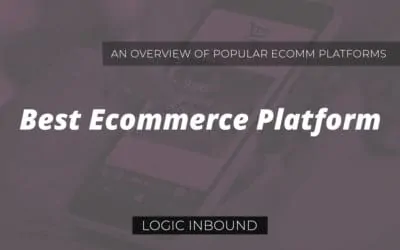Many e-commerce businesses these days are running on WordPress. While WordPress started out as a simple way to make a basic blog or website, it has evolved into an important platform for e-commerce businesses to run and operate.
WordPress is interesting because of the amount of templates and plugins that are available. You can fully customize your WordPress site to make it distinctive from the slew of other similar websites out there. You can even combine it with specific e-commerce platforms like WooCommerce to create very in-depth business websites.
But when it comes to SEO, you need to understand best practices on your own in order to have a strong presence in searches. WordPress can help you make a beautiful and professional-looking website, but SEO will largely be on your shoulders. Logic Inbound is eager to help you with all your SEO needs for your e-commerce website. Find out how we can help by reaching out to us here.
What is WordPress?
You might have heard a lot of buzz about WordPress but be new to actually using the platform. Here is a simple breakdown of what WordPress is and how it works for e-commerce sites in particular.
WordPress is a simple and initially free way to create a website. In fact, you will only start paying for WordPress if you go beyond the basics. Many themes for WordPress are free. You can simply apply them to lay the groundwork for your website. But you can also pay for premium WordPress themes that are a little more complicated and feature rich.
WordPress started out as a blogging system and some people still do use it that way, but with all the upgrades and improvements since it launched in 2003 it has become so much more. Today, any real businesses rely on WordPress as the platform for their professional websites. By layering plugins, widgets, themes and custom code on top of the basic WordPress platform, e-commerce businesses are creating fully customized online stores.
What is SEO: Definition of Search Engine Optimization?
It isn’t enough to just have a platform, though. Successful online businesses also adhere to SEO best practices and understand the ins and outs of search engine optimization.
SEO, or search engine optimization, is the process of getting your website to the top of Google search results so that as many people as possible see your website and visit it, ultimately becoming fans and customers.
At Logic Inbound, we are experts on SEO. We have a well-rounded strategy that helps us optimize our clients’ business websites, whether they’re lawyers or outdoor adventure guides or anything in between.
Our SEO strategy hinges on understanding your business first, then delving into extensive keyword research to connect customers with your products and services. The key is getting your name in front of the right kind of customers, people who are searching for your products and services but may not realize you can help them yet. We also provide excellent SEO-rich content and site structure alignment, whether you’re using WordPress or another platform.
WordPress Plugins and SEO
One of the most exciting features of WordPress is the extensive plugin options available for deep customization.
WordPress currently offers nearly 54,000 plugins. That’s an overwhelming number to try to wade through, but luckily not all of them will be useful for your website. Here are a few WordPress plugins we particularly like when it comes to WordPress and SEO.
- Yoast SEO: Yoast SEO is the top WordPress SEO plugin, with more than 5 million active installations currently. It is an incredibly powerful tool that many e-commerce businesses rely on for their day-to-day operations. Yoast SEO can help you write content by giving you feedback on your content to show you where you can improve SEO. It also integrates with Google Search Console to give you analytics on Google search results.
- All in One SEO Pack: All in One is meant to appeal to beginners and is focused on ease of use. This is great for people who don’t want a hassle when doing their SEO. Business owners are busy people, but All in One makes it easy to find time in your overwhelmed schedule for SEO strategizing. It is one of the most downloaded WordPress plugins of all time and also supports Google Analytics. It can automatically optimize your titles and generate meta tags for you.
- The SEO Framework: The SEO Framework aims to bridge the gap between beginner and expert when it comes to SEO. The plugin comes preconfigured if you aren’t sure where to start and automatically configures SEO. Or you can upgrade to the professional version to get powerful SEO tools that can help you advertise through Google, Facebook, Twitter and other social media websites.
- MetaSlider: This plugin is specifically aimed at slideshows. If you have a website that calls for slideshows of any sort, MetaSlider can help get those slideshows SEO optimized so you get more visibility in search results. MetaSlider is the most popular slider plugin for WordPress and uses images from the built in WordPress media library. MetaSlider helps you populate SEO fields when building a slideshow so that you can appear more prominently in search results across the web.
- ACF Content Analysis for Yoast SEO: This plugin works with the Yoast SEO plugin mentioned above. It ensures that the Yoast SEO plugin analyzes all ACF content, which includes flexible content and repeaters. ACF is advanced custom fields. This content is often missed, even by Yoast SEO. So if you are an advanced user of Yoast SEO, you may also want to get this plugin to ensure all your data is fully optimized.
- WP Meta SEO: WP Meta SEO lets you edit metadata while giving you a live SEO analysis of that content as you work. You can also bulk edit text. This plugin is a great way to mass edit your metadata while seeing in real time whether or not it is adhering to SEO best practices.
WordPress Blog SEO
Whether you are running a business or a personal website, many WordPress websites include blog elements (or are simply standalone blogs and nothing else). If you have any amount of blogging on your WordPress site, there are a few simple steps you can take to improve your SEO across your WordPress site.
In fact, a blog can be a great way to improve your website’s SEO even if it is strictly a business website that you don’t think needs any amount of blogging. A blog allows you to tap into keywords and position yourself as an expert on your products and services. It is a great way to turn customers into fans. Show them you are just as big an enthusiast on your products and services as they are!
Here are some simple ways to improve your SEO on your WordPress blog:
- Do keyword research to understand what people are searching for in order to find your website
- Learn which keywords are trending or popular and create blogs on those topics if they are relevant to your business
- Optimize the metadata in your blog posts, including the title, URL, tags and description
- Use links and images to make an attractive and useful blog that people genuinely want to read
- Write and update regularly so that content doesn’t get stale or old
If this sounds daunting, reach out to Logic Inbound to see how we can help you create valuable content for your blogging and SEO needs.
Google SEO
Google still accounts for the overwhelming majority of searches conducted online by anyone. Therefore, targeting your SEO strategy toward Google’s best practices is absolutely critical.
Google provides a guide on SEO. Some of the highlights include:
- Improving site structure so your URLs are better and you site is easy to navigate
- Optimizing your content so anchor text, images and header tags are improved
- Optimizing SEO for mobile phones, which account for a large amount of search traffic
- Using promotions correctly
- Understanding analytics and other tools that you can use to scrutinize your SEO
Google encourages people to create robust websites with useful links and images and a strong underlying structure. This will not only make your website appear more prominently in search results, but it will also convince visitors to stick around for longer, since your website will be more user-friendly.
SEO Marketing
In addition to creating content, you can also use SEO for marketing. In fact, the two ideas often go hand in hand.
SEO marketing is not like other types of marketing. You don’t simply announce a product and a price. Rather, SEO marketing is about creating genuinely useful and meaningful content and letting customers make 
As a marketing strategy, SEO is particularly suited to the internet. SEO marketing creates value for your business or company by generating more website traffic and views. SEO means you appear at the top of search results and present yourself to the world as an expert and not just a place to shop.
This can be more challenging than traditional marketing, especially for businesses who aren’t used to this type of marketing. The benefits don’t come right away in the form of hard numbers and concrete sales. You have to commit to the strategy for a while before you begin to see the payoff.
That does not mean it is not worthwhile, though. SEO marketing creates fans and not just customers. If you invest the time, you will get lifelong fans in return who see you as a resource and authority rather than just a store.
SEO Tools
There are many tools available if you are looking for ways to improve your SEO. We covered many of the top SEO plugins for WordPress above, but there are also a slew of other tools that are not directly tied to WordPress. You don’t need to stick only to WordPress plugins when looking for SEO tools.
One great resource that is outside of WordPress is Google. They offer a lot of tools that are excellent for improving your SEO on WordPress.
- Google Search Console: This free tool lets you keep things running smoothly and spot issues before they become major problems. With Search Console you can see if there are underlying problems in your site, such as crawling issues and broken links. It’s easy to miss these types of issues in the day-to-day bustle of running your business but they can really damage your SEO overall.
- Google Adwords: Adwords Keyword Planner is a way to gain insight about keyword searches. This can help you with planning out your content. See which keywords are trending and relevant to your business, then build your SEO strategy around those. This can help you focus your efforts so you don’t waste time on keywords that aren’t going to help improve your search ranking and SEO.
- Google Trends: Trends is similar to Adwords, so you may find you only need one or the other. But with Google Trends you can compare site traffic across different keyword searches to see where people are searching and how. It’s a great way to get a bird’s eye view of search habits across the internet to see where you can target customers.
- Content Experiments: This is an interesting program. It allows you to try out different versions of the same page on your website to see which version customers respond best to. This is a time consuming experiment, but allows you to take SEO to the next level by optimizing every page down to the smallest details.
- Google Places for Business: SEO is also local. Google Places for Business gets you a local listing. It sounds counterintuitive, but often when people search online, they are hoping to find a physical store to go to. As popular and essential as the internet has become, people still want to shop local when they can.
- Google Analytics: If you don’t know about Google Analytics, you should. It is the tool for seeing how your website is performing. You can get an incredible amount of data about how your website is performing through Google Analytics and track specific links around your site to see where people are clicking and when.
SEO Services Company
Ready to take the first steps to improving SEO on your WordPress website? Contact Logic Inbound to begin your SEO process. We have the experience and knowledge to work with you no matter what the size or nature of your business. Get started today.




0 Comments